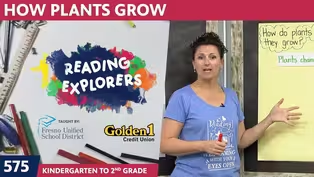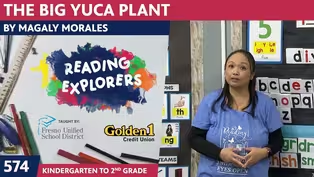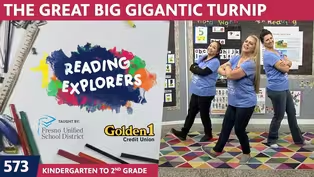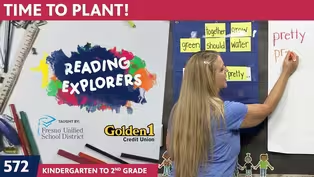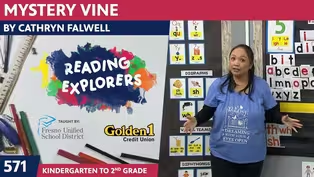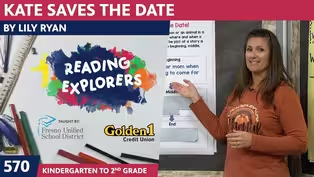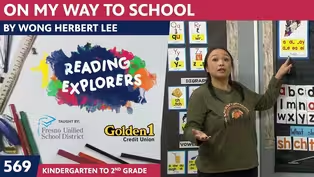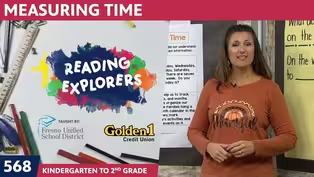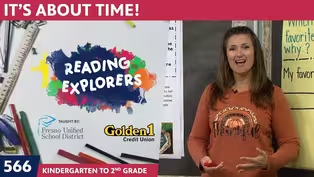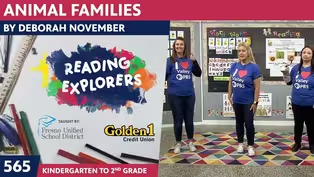
3-308: Identifying Common Roots or Base Words
Season 3 Episode 32 | 14m 15sVideo has Closed Captions
Join Mrs. Nix at Camp Discovery!
Third Grade teacher, Mrs. Nix, welcomes students back to Camp Discovery, a fun learning space packed with reading adventures & fun games!
Problems playing video? | Closed Captioning Feedback
Problems playing video? | Closed Captioning Feedback
Reading Explorers is a local public television program presented by Valley PBS

3-308: Identifying Common Roots or Base Words
Season 3 Episode 32 | 14m 15sVideo has Closed Captions
Third Grade teacher, Mrs. Nix, welcomes students back to Camp Discovery, a fun learning space packed with reading adventures & fun games!
Problems playing video? | Closed Captioning Feedback
How to Watch Reading Explorers
Reading Explorers is available to stream on pbs.org and the free PBS App, available on iPhone, Apple TV, Android TV, Android smartphones, Amazon Fire TV, Amazon Fire Tablet, Roku, Samsung Smart TV, and Vizio.
Providing Support for PBS.org
Learn Moreabout PBS online sponsorshipMore from This Collection
Valley PBS and Fresno Unified School District have partnered with Golden 1 Credit Union to create Reading Explorers Lessons for grades Pre-Kindergarten through Third grade. The daily lessons will be taught by Fresno Unified School District teachers and are created to help students practice their reading skills and reinforce lessons during distance learning.
Video has Closed Captions
Learn about the life cycle of a plant on Reading Explorers. (26m 39s)
K-2-574: The Big Yuca Plant by Magaly Morales
Video has Closed Captions
Join the Reading Explorers as we adventure into a new book The Big Yuca Plant. (26m 30s)
K-2-573: The Great Big Gigantic Turnip
Video has Closed Captions
What will happen at The Great Big Gigantic Turnip? (26m 30s)
K-2-571: Mystery Vine by Cathryn Falwell
Video has Closed Captions
The Bell has rung and the Valley PBS Classroom is open once more. (26m 32s)
K-2-570: Kate Saves The Date by Lily Ryan
Video has Closed Captions
Mrs. Nix, Mrs. Hammack and Mrs. Vang are glad to have you join her for a new day. (26m 32s)
K-2-569: On My Way To School by Wong Herbert Lee
Video has Closed Captions
Mrs. Vang is ready for a new day of phonemic awareness and reading comprehension. (26m 40s)
Video has Closed Captions
We review phonics, frequency words and more on Reading Explorers. (26m 45s)
K-2-567: Nate The Snake Is Late
Video has Closed Captions
What happens when Nate the Snake is late to school? (26m 49s)
Video has Closed Captions
It's time for school! How do you know what time it is? (26m 31s)
K-2-565: Animal Families by Deborah November
Video has Closed Captions
Welcome to the Reading Explorers lessons in the Valley PBS Classroom. (26m 14s)
K-2-564: From Caterpillar To Butterfly
Video has Closed Captions
The transformation from Caterpillar to Butterfly is a special one. (26m 52s)
Providing Support for PBS.org
Learn Moreabout PBS online sponsorship♪ Good morning to a brand new day ♪ ♪ Time to learn and games to play ♪ ♪ Learning things is so much fun ♪ ♪ Learning is good for everyone ♪ (upbeat guitar music) (bouncy music) - Good morning third grade, my name is Mrs. Nix and I am so excited to be here with you on Wednesday morning so that we can become better, you got it, thinkers, readers and writers.
So, this morning I went back to my favorite illustrator.
what is an illustrator again?
You guys know this, I know it, the person who draws the pictures in our stories.
Okay, so this one's called I Wanna New Room.
And the illustrator is David Catrow, my most favorite illustrator, look how silly all of those pictures look.
Now this particular one is by Karen Kaufman and it's called I Wanna New Room and the character in this story happens to be writing a letter, I think his name is Alex, is writing a letter to his dad about all the cool things that he wants in his room and he's getting really creative with it.
You wanna find out if gets it, that new room?
You're gonna have to check out this book.
Now, to do that you can check out the local county library or you can go on Sora and check it on from Sora.
Look up David Catrow, maybe you're gonna find that he's a fantastic illustrator.
Okay, speaking of Sora, we love to count down our top schools that are checking out books using Sora.
So, let's see who is our third place school for this particular week.
I've got it right over here and it is... Birney Elementary, excellent job Birney, I'm so excited, you guys are doing a great job.
So keep up all that hard work.
You know what, it's so easy to be able to get your school up here, you just need to checkout books from Sora, invite a classmate or two or three or four or five.
And your school can be up on our poster, excellent.
Now, the last thing that I just wanna put in a little reminder to, is if you are interested in having a really fun activity book, this is full of games and puzzles and word searches and all sorts of things.
If you are interested in having one of these, it's free.
All you need to do is send me an email or write a letter to the address below that's right there on your screen.
Remember to include your return address so that I can get this out to you.
Tell me about something that you're doing in your classroom.
Something you've learned on PBS or maybe, just maybe, you could write to me and let me know, what is a great book that you've been reading that you've enjoyed.
I'd love to hear all about it.
Alright, are we ready to get started today?
Great, let's go through, I've got three things for us to do today.
We're gonna go through, we're gonna look at some variant vowels.
We're gonna look at some related words and then we're gonna finish up with a little bit of comprehension, where we're putting those related words, those root words, with some prefixes and we're putting them into a sentence, and we're making it make sense today.
Really gotta be thinking, so let's get our brains warmed up.
Are you ready?
Okay, so high frequency words, let's go through, let's read them together.
You guys read 'em big and loud at home, here we go.
Said, same, run, round, right, ride, read or read, that's right, red, put and ran.
Nicely done.
Okay, so let's look right here, today we're gonna practice these two, so we've got right, R-I-G-H-T. And ride, R-I-D-E.
So help me put these in a couple of sentences.
Read 'em with me.
It turned out that I was mmm.
And would you like a mmm to school?
Hmm, you know what?
Would you like a ride to school was always my favorite question that I was asked in the morning, 'cause I loved getting a ride to school, I always had to walk.
Okay, how 'bout this one?
It turned out that I was right.
Oh, that doesn't happen very often but it sure feels good when I'm right about something, if I can get the answer right.
Great job, okay, let's jump in and let's look at those variant vowels.
We had two of them this week.
I brought my sound spelling cards to remind me of those sounds that we're working on, do you remember what they are?
We've done 'em the last couple of days.
Let's look right here, this'll help us out.
We've got the spoon card.
The spoon card reminds us of that ooh sound.
So, there are seven different ways that you can spell ooh.
Okay, so how do we know when to use all of those?
I wish that I had a magic trick for you.
This is where reading really become important, so the more you look at words, the more they're going to become more familiar.
So the more you read, the better you are.
Alright, so let's look at some of these words and read 'em together.
So we've got the ooh, like in spoon and igloo.
Look at that, igloo.
Alright, you know that's like an ice chest, right?
Okay, alright, so...
It's also like an ice home.
E-W says ooh like in chew and drew.
Like she drew a pretty picture.
U blank E, like in tube and rude.
U-E says ooh like in due, we've talked about library books being due and look at this one, clueless.
Good.
And U just by itself says ooh like in future and junior.
And then we have U-I says ooh like in fruitful and juice.
O-U says ooh like in soup and routine.
Excellent and then I brought my book sound spelling card, book, uh, uh, okay.
Remember just like you're pushing a little bit on your tummy, uh, okay.
So, let's practice some words with that, 'cause look, we've got the O-O.
Just like we were doing with the ooh but now it says uh, like in hook and crooked.
And O-U like could and would.
Excellent.
Now, I wanted to kind of switch gears, we're gonna talk about related words.
And that just simply means that they share a common root or a base word.
So when we're looking here, we're looking, do we see a word that, if we took away the prefixes and the suffixes and the inflectional endings, do we see a base word with all of these words that are here.
So, let's look.
Unwrap, wrapper, wrapped, wrapping.
Do you see it?
Yeah, right here.
So, wrap can actually be found in all of these words, it's just a small part, so, all of these words are considered related.
Okay, so what does that look like when we are practicing it?
Let's go through, let's do some variant vowels and let's do some related words.
So we've got some words here in a row.
And it says if the word does not have the same vowel sound as the other words, mark it with an X.
So we wanna find the one that doesn't sound the same.
So read 'em with me.
Spoon, could, booth, chew.
Okay, so, ooh, booth, spoon.
So could has the uh sound.
Okay, here we go, let's try it again.
Tube, clue, renew, look.
Ah, look has the uh sound, so we don't want that one.
These all had the ooh.
Notebook, would, groups, nook.
So we've got nook, would, book, so groups does not go 'cause that had that ooh sound, do you see how it's going?
Okay, numeral, gloom, should, July.
Alright, these are all have the ooh sound, right?
Should has the uh sound, so we're gonna cross that off.
Excellent, alright, now we're gonna switch up just a little bit and we're looking for related words that have that common root or base word.
We're gonna circle the related words, but now we gotta find them within the sentence.
This is gonna be a little tricky, help me out.
Okay, this metallic street sign is made of several kinds of metal.
Do you see the word metal right here?
Metal and metal, so these are have the same root with them.
Oh, you guys are great.
My dad is my travel companion and he is always good company.
I've got company, companion, I see a lot of the same letters right there, companion and company are related words.
Okay, let's look again.
The main actor stars in a lot of action movies.
What do you see?
Actor has act, okay.
And so does action, it also act, do you see it?
Nice and the last one, I turned off the television when the telephone rang.
I can hear that one a lot.
That's got that tele, right?
Alright, so telephone and television, excellent.
Okay, let's finish off by looking at, and we're gonna put together some of that stuff that we were just learning about.
Here's what's gonna happen.
We're gonna talk about those root words and I kinda wrote a few little notes down here so that we could practice looking at 'em, just a reminder that root words, they don't have any prefixes or suffixes or inflectional endings, that's some of the stuff that we were talking about.
Let's look here, we're gonna start with this sentence.
We're gonna figure out what's gonna go in this missing spot.
And we're gonna use one of these root words but it's gonna need some help, we're gonna have to use one of our prefixes to make it make sense.
Alright, let's do it together, here we go.
This riddle is mmm, I don't understand it at all.
Okay, don't understand it at all.
Does it make sense?
Probably not, right?
Would we use the word perfect?
This riddle is perfect?
Probably not.
How 'bout possible?
Well, if you don't understand it, that could be something that could go there so let's keep that one in mind.
How 'bout heat, were we talking about the weather at all?
No, okay, how about sense?
Does it make sense?
Ah, 'cause I don't understand it, so it doesn't make sense, okay, so watch this.
We're gonna put sense because we know that that's dealing with understanding, right?
But it doesn't make sense.
So what do we have to add to the word sense to change it, so that it's not making sense, let's look up here at our prefixes.
If we wanna add something that means before, we would put pre, so that's not what we're looking for.
How about not, so it's not gonna make sense.
So would I say unsense?
Imsense?
Or nonsense?
You guys are so smart.
Nonsense means it doesn't make sense.
So, this riddle is nonsense.
I don't understand it at all.
Fantastic job.
Boys and girls, I have had so much fun hanging out with you this morning as you're getting ready for school.
And I just wanna say, remember, you are responsible for your learning success.
Ask those questions, listen and share your ideas.
Together, we can do so much more.
And thank you guys, thanks for hanging out with me this morning, I can't wait to see you back here tomorrow on PBS, so that we can go through and practice all of these together.
Have a great night, I'll see you tomorrow, bye-bye.
(upbeat guitar music) ♪ Good morning to a brand new day ♪ ♪ Time to learn and games to play ♪ ♪ Learning things is so much fun ♪ ♪ Learning is good for everyone ♪ (upbeat guitar music)
Support for PBS provided by:
Reading Explorers is a local public television program presented by Valley PBS
